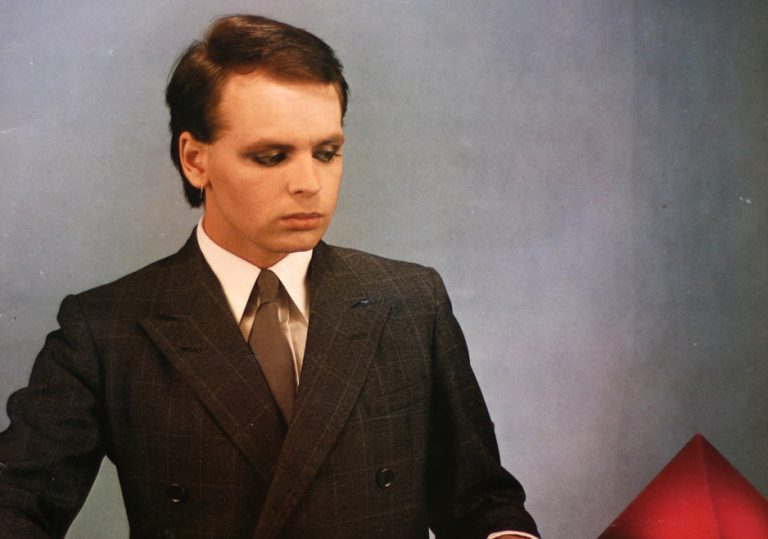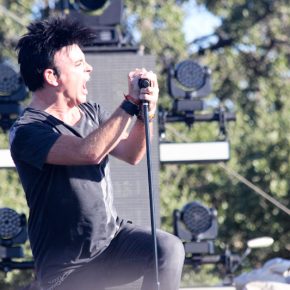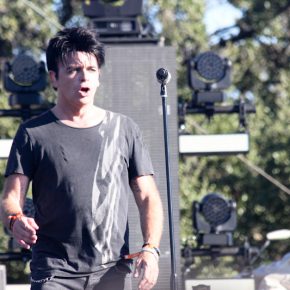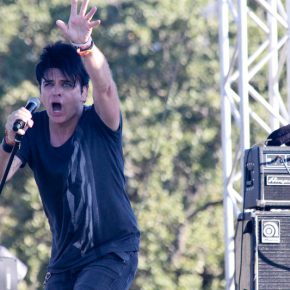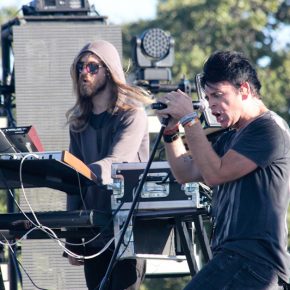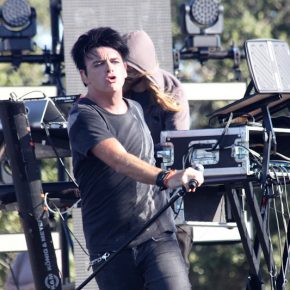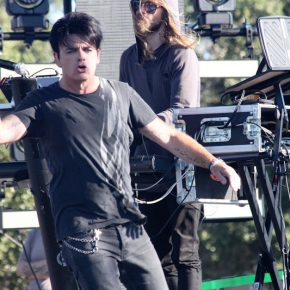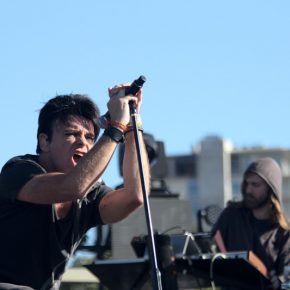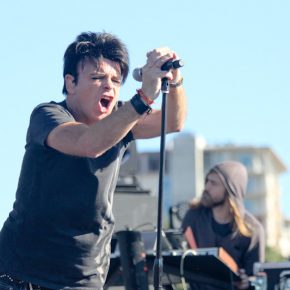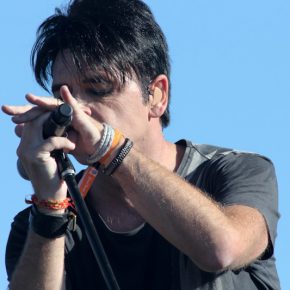We had the opportunity to interview the great new-wave pioneer Gary Numan before his set at Fun Fun Fun Fest in Austin, TX. We asked him about his thoughts on being a major influence to acts like Nine Inch Nails, The Foo Fighters and others. He also spoke to us about his introduction to the electric guitar, his first contract, as well as his friendship with guitarist Robin Finck.
What’s your first memory of music?
Hank Marvin & the Shadows whenI was about 4; it was on a TV show I can’t remember the name for. I remember he had an electric guitar and that’s what got me into the whole thing. I actually got into the technology rather than the music, and I was fascinated by electric guitars and the buttons. I think that’s why I’ve gravitated toward electronic music eventually.
What does music mean to you?
It’s my whole life, really. It’s everything that I do. I’ve been doing it as a hobby ‘til I was about 18, 19. When I was a little kid, I was making up tunes when I was really little. I was still a junior in school. Since ’78 I got my first contract and I’ve been doing it as a career ever since. It’s all I’ve ever known, really, in one level or another. Yeah so it is, literally, my life.
You’ve managed to stay relevant for over 4 decades now and you’ve influenced bands like Nine Inch Nails most significantly, Foo Fighters, Marilyn Manson, and various DJs have remixed a lot of your songs. What do you attribute your success to?
Difficult to say. I’ve come at it from a non-musical direction. I’m not particularly skilled as a player. I can do alright with lots of different things; I’m not particularly good at anything. My thing has always been, my interest in music has always been sound. I’m interested in the sounds they make, the atmosphere of the song. My melodies are simple. There’s nothing overly complicated about anything that I’ve ever done.
But I don’t know. It’s difficult to know. I guess you would have to speak to the various people that say that I have influenced them to find out exactly what it was. Some people when they’re influenced by something they take it all, they just do their version of what you do. Other people it’s like a spark, it just ignites something in them. And I think I’ve probably been that to all these people. You know people like Trent [Reznor], and other people. These are very talented people. To them I would be a spark, a tiny little thing, an idea from a song or an album or something, and they would run with it and do something of their own. Something uniquely, or different than what I was doing. Other people would just copy it, you know? Like do their version of what I was doing. That happened a lot in the beginning. But I honestly couldn’t say what thing it is.
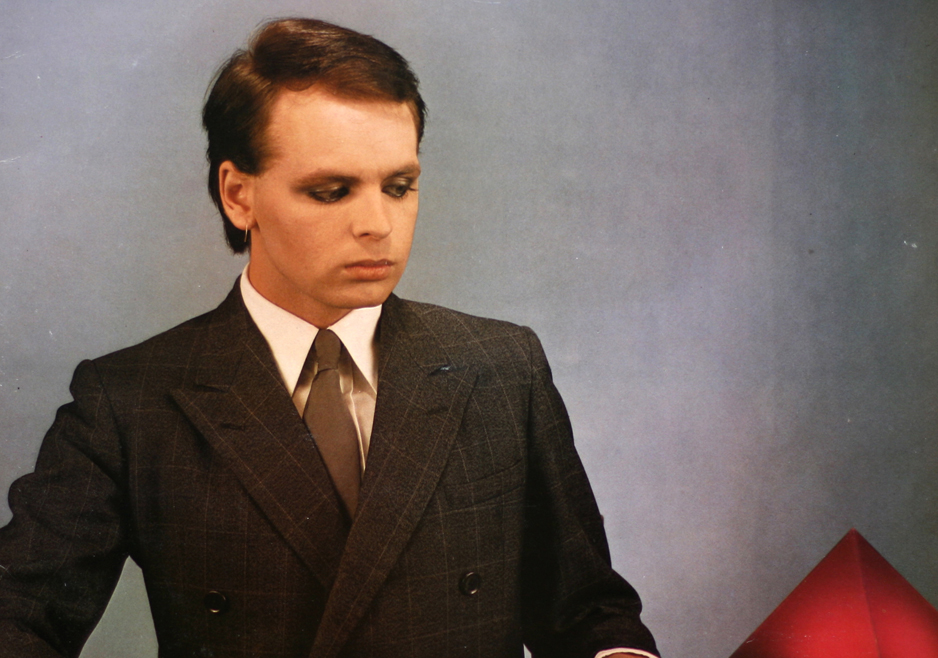
You know, hopefully, there are lots of different things. For some people it would be the sound, for some people it would be melody, the lyrics; I really don’t know. To be really honest, I don’t really care. I’m just glad that people think that. People acknowledge it and, say, people who do cover versions and samples of my stuff, a lot, still. I’m just really grateful, man, for everything that has happened. I don’t make music, I don’t make any album and then sit back and think someone is going to say that’s an influential record. I’ve never done that.
I remember when I was making the earliest stuff that a lot of people talk about now, I was struggling. I was in there struggling. You know, pulling my hair out just trying to get it right. I wasn’t sitting there thinking I was some kind of genius or a pioneer in music. I was terrified. I had few days to do it, not much equipment, no money and it was all frantic and hectic and just trying to do the best you could with very limited resources, and it was no feeling whatsoever that I was doing anything special. History makes it special, if you’re lucky, and if you’re unlucky, it doesn’t. Just the way it is. I do it because I love it. I love doing it. I love the event of it now and I bet I’ll still love it 20 years from now if I’m still alive.
You recently released an album. Is the recording process different now than, let’s say 1979 when you released your first album?
Yeah. ’78 was my first album. Yeah it was very different. You know, no computers then, very limited technology. My first two albums were done on a 16-track, wasn’t even 24-track. So it was far more basic than it is now. Nothing like it is now. Now it’s all done in computers and ProTools and software and plugins. There’s very little hardware involved at all in terms of synthesizers anymore. Now everything that I do is software. It’s a very, very different animal, but they’re doing exactly the same job. You perform something in the studio, you record it, you mess about with it, put it all together, put it out. It’s the same job, just different tools. A bit like a Model T Ford and a Rolls Royce, I guess.
Robin Finck contributed guitars to that album?
Some, yes.
What was that experience like?
Well, Robin and his wife Bianca are probably our closest friends when me and my wife moved to Los Angeles in 2012. We knew Robin from before, from when I was working with Nine Inch Nails, and so we just sort of met up when we arrived here. We just got really close. When I was making the Splinter album, half of it was done before I got here and I finished the second half of it once I got moved in to Los Angeles. Robin was coming around at the time; I wouldn’t have dared to ask him. It’s just like, “you’re one of the best players in the world,” and I got my own, Steve, who’s a guitar player. But then one day Robin just offered and said that he’d like to do something on it. I was blown away by that. I gave him 5 songs that were pretty much done. He went away with them. Came back with a world full of ideas for them and it was all brilliant. It was great man, it was great. He’s a very cool player. Very, very lovely person. Easy to work with. Great fun to be around, all the time. What he did was great combined with what my own English guitar player had done. He’d already done some of the best work he’d ever done. The two of them together just really helped make the album special.


